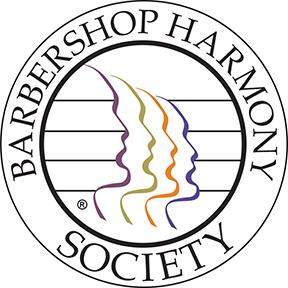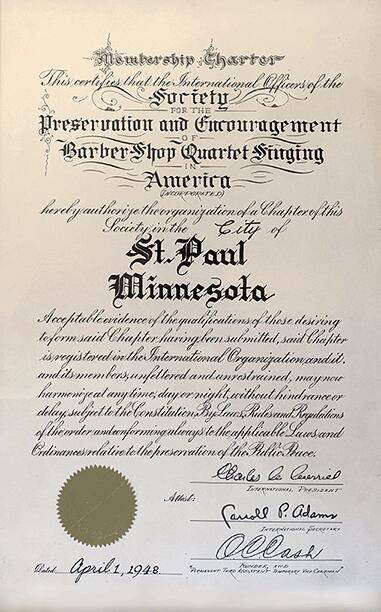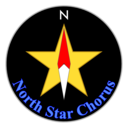

That’s not an easy question to answer. Even Barbershoppers often disagree, and sometimes it depends … well, this isn’t the place to get too technical. Lets just say that the melody is mostly in a middle voice, and unlike some other forms of music, you can stop anywhere and have a fairly pleasant sounding (or consonant) chord. Most other music is full of places where the melody note is one that’s not part the chord, creating a dissonance, while we find harmony that fits every melody note, hopefully without stretching the listener’s ears too much, so the changes from one chord to another sound natural.
The voices (bass, baritone, lead/melody, and tenor) are arranged and sung in such a way that the tones combine to produce other notes – harmonics or overtones – mostly higher, but sometimes lower – that aren’t really being sung, but are none-the-less quite audible at times. In fact, they are sometimes so loud listeners just accept them as notes being sung by someone until they start counting how many they hear and end up with more than four. We also tend to treat songs a little more freely when we decide on how to interpret a song, giving more weight or length to words we find more important than others. We’re often more involved emotionally and physically than performers in other styles, so one of the big differences you might notice is our faces and body movements reflect the message of the songs we sing. It becomes a total performance.
Getting more technical would be very easy to do, but if you want more information, you might check out the Barbershop Harmony Society website for starters. Be warned that sooner or later the definition will involve music theory and physics and may not be for the faint of heart.

While the origins of Barbershop are rooted in African American culture, the art had lost some popularity for both blacks and whites by the time O.C. Cash and Rupert Hall ran into each other in Kansas City in 1938. They decided that something must be done to preserve the music they enjoyed so much, and Cash returned home to draft an invitation to 14 men to join him at a meeting where they could once again revel in the sound of four part male harmony. They could bring guests if they wished, and bring guests they did. Twenty-six men were in attendance that April evening at the rooftop garden of the Tulsa Club where Rupert Hall was a member. They sang for several hours and a few quartets were born. The next week there were 70 in attendance, and things were off and running.
The organization was a bit loose in those early days. The group’s name was a little fun with the alphabet soup the government liked to use when naming things like the C.C.C., T.V.A., and W.P.A. Thus the official title would eventually become the Society for the Preservation and Encouragement of Barber Shop Quartet Singing In America or S.P.E.B.S.Q.S.A. The joke is mostly lost on people today, and we’ve made Barbershop into a single word, so recently we’ve changed the working title to Barbershop Harmony Society or B.H.S., but the old name is still the official one, for now at least.
From that evening back in 1938, the organization grew to thousands and tens of thousands all over the country, and ultimately the world where there are affiliated organizations in Europe, Africa, New Zealand, and Australia. There have been society contests for quartets as early as 1939 and choruses from 1954. Headquarters were in a lake shore mansion in Kenosha, Wisconsin for 50 years before moving to Nashville in 2007. In addition to facilitating and perpetuating the style, the society also publishes music and other materials and maintains a talented staff to educate members and non members alike in the best ways to be successful at singing in the art form, with an emphasis on introducing youth of any gender to the hobby.
Recently, the society has decided to have female members as well, though they have left the decision whether or not to include women up to the individual chapters. The North Stars have decided to continue being an all male group for now, rather than try to support the additional infrastructure having more than one barbershop experience would require: male, female, and mixed. There are also two American organizations for women only, Sweet Adelines and Harmony Incorporated.

We are a fully non-profit 501(C)3 organization, with taxpayer ID 41-6051126, registered with the IRS under the title Society For Preservation & Encrgmnt Of Barbershop Quartet Singing Amer (H073 Greater St Paul Area).
© 2025 All Rights Reserved